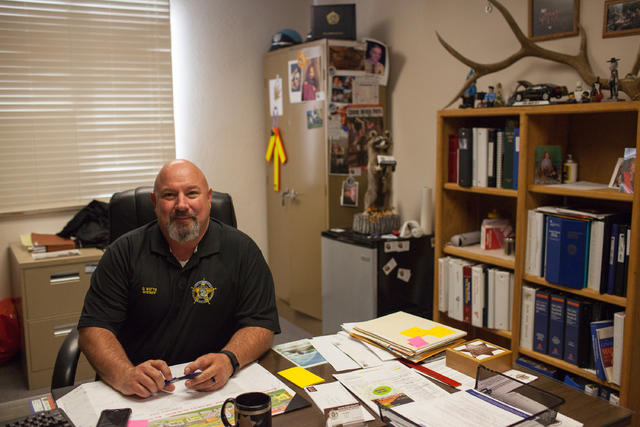Who’s in trouble in Ely? Check the police blotter
WHITE PINE COUNTY — Sheriff Dan Watts is a muscular man with a shaved head and salt-and-pepper goatee. Nearly three decades in law enforcement have taught him this about places like Ely — the biggest small town in his mammoth patrol area: Some residents don’t have a heck of lot to do. And nearly everyone loves a juicy piece of gossip, scandal, buzz or scuttlebutt — as long as it doesn’t involve them, of course.
Luckily, in Ely, as well as in towns and cities across Nevada and the U.S., there’s a regular chronicle of the human condition that’s become a must-read among residents.
It’s the daily police blotter — a haikulike compilation of bite-sized bits of salaciousness and dirty laundry. Consider it the public stockade of American culture, particularly in small towns and rural areas, a circumstance most people avoid like a court summons or a too-tight set of handcuffs.
“Oh, yeah,” Watts said with a laugh. “The blotter gives people something to talk about.”
The White Pine County Sheriff’s Department has published a blotter for decades. Years ago, Watts explained, the brass decided to block reporters from snooping through the department’s incident reports, recording reams of personal information officers just didn’t want to go public.
So officials created the blotter, featuring spoon-fed news nuggets written by deputies. But in the late 1980s, the practice was discontinued for unknown reasons.
When Watts became sheriff nine years ago, he heard the rumblings. Residents cornered him at meetings and on the street. And they weren’t happy.
“They wanted the blotter back,” he said. “I hate to say this, but they looked forward to reading it. People said they didn’t know what was going on without their daily blotter.”
■ ■ ■
Officers received a report of a fight that had taken place at a local bar. When officers arrived the individuals involved reported that nothing had happened. The incident was documented.
Reporting party stated that the lights were on in her home and she was unable to turn them off. Officer turned the lights off for her.
Reporting party stated that someone had painted an alien message on the ground in a local parking lot. Officer patrolled the area and reported that it was only a shadow from a vehicle.
■ ■ ■
In Ely and elsewhere, blotter items range from the just plain weird to the serious — the names of local residents arrested on charges including public intoxication, indecent exposure, spousal abuse, not to mention embarrassing drug and alcohol arrests.
White Pine County spreads for 9,000 square miles. Of its 10,000 residents, 7,000 live in Ely, and the rest in smaller towns including McGill, Baker, Lund, Black Horse and Pony Springs.
Watts’ small staff of deputies patrols it all.
The sheriff is a Boulder City native who once worked as a sign hanger on the Strip before moving north to an area he said is marked by drug use and transient mine workers.
He is continually amazed by the reasons people call on law enforcement here — like the lady who couldn’t get her window to close or the man who got drunk and lost his shoe.
“One guy said his TV reception wasn’t good,” he said. “You just have to shake your head, be patient and explain that we don’t have the manpower to handle things like that.”
The blotter is published not only by a handful of area newspapers, but also on Facebook. That has boosted readership, with people reading from as far away as Las Vegas.
Gary Cook, publisher of the Ely Times, a local weekly, called the blotter insanely popular, the place people check first to see if a relative has been arrested, and for what.
“One resident complained his neighbor was piling snow too close to his fence,” he said. “These items say a lot about a community, but mostly that people have too much time on their hands.”
■ ■ ■
Reporting party stated she was using a gambling machine at a local casino, but left the machine to do other business. When she returned to the machine someone else was using it. She was advised that no crime had occurred.
Reporting party stated that her gun came up missing around four years ago and now she believes it was stolen. A report was completed.
Reporting party claimed her ex-husband piled all of her belongings on the sidewalk outside her house. A report was completed.
■ ■ ■
Sgt. Jaime Swetich began writing the blotter five years ago. Now 41, the Ely native knew the kinds of things that got inside people’s craw here.
He said deputies respond to any kind of call — from an alarm at a credit union to a report of a barking dog, each documented in a written report.
But Swetich began to see a pattern: the same barking dog and same complainant. To relieve the monotony, the 19-year veteran took a new tack: He became the satirical Shakespeare of the department’s police blotter.
He peppered the blotter with words such as “cacophony,” “temerarious,” and “conflagration” — the more flowery and outrageous, the better.
“I try to find big words so people have to look them up,” he said.
Residents reported that they had to consult their dictionary to negotiate the blotter. A high school teacher thanked him for raising awareness of the language.
One item read: “The reporting party claimed another male subject had been beleaguering him. Both subjects were advised to abstain from all superfluous confabulation.” And: “Found to be due to a malfunction, the alarm was.” And another: “The subject was found not to be intoxicated, but enervated from his protracted wayfaring.”
The blotter is so well-read that suspects ask that their arrests not be included — like the well-known resident collared for propositioning a stranger in a hotel men’s room.
“I had to inform him,” Swetich said, “that we don’t do favors.”
But Swetich sometimes softens. Like the time he and a partner answered a 2 a.m. call from an elderly dementia sufferer who swore that “little people” were invading her home. She said they were coming from a crack in the ceiling over her bed.
The officers taped the crack and pretended to lead away an invisible suspect in handcuffs.
“I told her, ‘We got ‘em,’ and she was thrilled,” Swetich said. “Often this job isn’t crazy crime fighting. In any big city, nobody would have even gone out to talk to her.”
■ ■ ■
Reporting party states that his neighbor was pumping metal into his apartment causing physical ailments. The incident was documented.
Officer received a report of an individual who was sleeping on the floor of a local casino. Officer contacted the person and advised him he needed to leave the establishment.
Reporting party stated that her husband who was intoxicated had left their home and had taken their television. The area was patrolled, but the husband was not located.
■ ■ ■
Jim Jones has been a lifelong fan of the police blotter. The Santa Cruz, California, resident eventually became an unofficial expert on the perverse rationale behind the items: “Most blotters report not crime but perception — what people are afraid is going to happen.”
He was also so captivated by the blotters’ lyrical style that he published a 2014 book, “Police Blotter Haiku,” featuring blotter excerpts “boiled down into seventeen syllables of raw humanity.”
One reads: “They argued, he left. She smeared pasta on his car. He shouldn’t have left.” And, “‘This is not a bomb.’ Scrawled on a box that wasn’t. So they had to check.”
Most blotter items fall into categories: mistaken identity, men and women getting on each other’s nerves and, “Is the guy standing outside my door actually a bear?”
Many incidents, he said, pose two opposing realities. “One guy says, ‘I think it’s OK if my dog poops on your lawn.’ And the neighbor responds, ‘No, it’s not, but it is OK for me to take out my machete and chase you down the street.’”
Residents of wealthy communities with high tax rates feel free to call police on the slightest whim, while those in blue-collar communities deal with the poor impulse control that comes with drug and alcohol abuse.
Jones, 60, is compiling a new book of blotter items involving men without shirts.
“If you see a shirtless man someplace where he should be wearing his shirt, he’s going to be a loose cannon,” he said. “A lot of this takes place in towns not in good shape, where meth is used, where there’s not a lot of jobs.”
He paused: “And then there’s Florida.”
■ ■ ■
Reporting party stated two individuals had stayed at his home and now he wants them removed. Officer contacted the individuals and advised them to leave.
Officer responded to report of man who was intoxicated and throwing a fit. He had banged his head through a window and was hitting himself with a hammer. The individual advised that he was fine and requested no assistance.
The reporting party claimed a family member took her photo without permission. A report was completed.
■ ■ ■
The sheriff knows wacky calls are part of the job. So he has advice for his deputies.
“I tell them ‘Guys, if they call us, it’s important to them — even if it’s not to us or anybody else,’” Watts said. “So, go out there and calm them down and advise them how to fix the problem.”
Then they write a report, which goes into the police blotter.
































